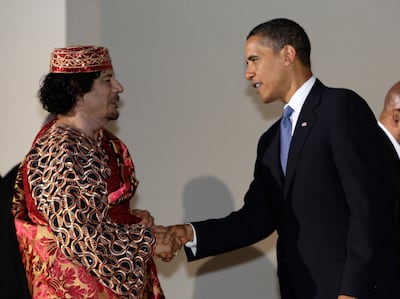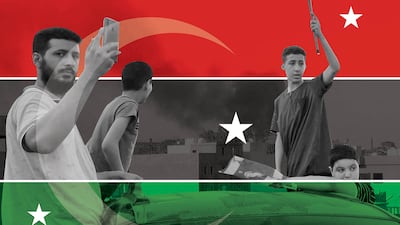This past week, Israeli Foreign Minister Eli Cohen announced what has since been called a planned, secret meeting in Rome with his Libyan counterpart, the Government of National Unity’s Najla Mangoush. The announcement, which Libyan Prime Minister Abdul Hamid Dbeibeh and Israeli Prime Minister Benjamin Netanyahu have both denied clearing, created a regional diplomatic fracas. It led to public protests in Libya, inter-agency finger-pointing in Israel, and Ms Mangoush’s dismissal and exit from Libya on a private plane.
While some sections of the media have focused on the possible harm this incident may have done to prospects for a Saudi-Israel deal, this is not the most useful question. On the 12th anniversary of the ouster of its leader Muammar Qaddafi, it is important to ask how this incident reflects Libya’s deep political dysfunction, and what can be done to mitigate the damage that its disintegration has caused inside and outside the country.
The story goes back decades. In 2003, the US struck a complex deal with Qaddafi in the shadow of the Iraq War, tied to two linked efforts: the co-opting of Qaddafi to support the War on Terror, and the attempted co-optation of Qaddafi’s Islamist enemies to serve the same end. Without a clear roadmap for the West-Libya relationship, however, the honeymoon slowly dissolved into mutual recriminations. Qaddafi became fond of saying: “I gave up my nuclear weapons [such as they were] – and for what?”
The US-Libya relationship cooled further under the Obama administration. This left the two countries without an open channel of communication, when things went haywire – which they did during the Arab uprisings that began in neighbouring Tunisia in late 2010. Isolated and enraged, Qaddafi became an easy sacrifice to a wave of regional change, when western intervention in Syria, for example, was unpalatable.
In the period between the intervention in March 2011 and Qaddafi’s public lynching months later, better-organised, better-funded and heavily armed Islamists and local militias attempted to sideline the so-called “moderates”, who participated in Qaddafi’s reform process and sold the US on intervention at the 11th hour.

Over the following year and a half, Libya’s security situation declined rapidly, even as the interim government managed to pull off two reasonably free and fair national elections – a testament to Libyans’ desire to redeem the revolution. By then, however, Libya’s medium-term fate was sealed.
Then, on September 11, 2012, Al Qaeda proxies attacked the US mission in Benghazi, driving the Americans, and much of the West, out of Libya. This paved the way for militants affiliated with Al Qaeda and ISIS to take over of much of Libya’s east, and contributed to chaos in Syria, the Sahel and elsewhere.
The attack forced the political transition process back in Tripoli into a nosedive, and in 2014 Libya split between east and west, following another round of elections. This was another turning point, as the winners were forced to decamp to Libya’s east, while the international community recognised the self-proclaimed government in the west. In the crucible of “Benghazi” was thus born the outlines of the current political architecture, with the eastern government backed by Field Marshal Khalifa Haftar’s Libyan National Army. Field Marshal Haftar, it is worth noting, previously served in the Libyan army under Qaddafi.
Over the following years, the UN attempted to stitch the two governments together again, beginning with the 2015 Skhirat Agreement that created the so-called Government of National Accord. Obstacles were often overcome by fiat, and without drawing in those with significant influence on the ground – including Field Marshal Haftar. The mixing of elected and unelected bodies, with officials appointed by foreign bodies, effectively severed the thread of political legitimacy accorded by the early elections. Libya’s political scene became a Frankenstein of inconsistent external mandates and local militia rule. Western leaders, meanwhile, focused on the short-term political liabilities associated with ever-growing flow of African migrants entering Europe, and terrorist attacks linked to Al Qaeda training camps in Libya.
The sad reality is that today, despite the continued suffering of Libyans, many of the country’s powerbrokers much prefer to tolerate a broken status quo, rather than submit to national elections. This leads us back to the current Libya-Israel fracas.
The US and other countries have been hinting that it would like to see the Government of National Unity give way to yet another interim government that will then lead the country to elections – despite an obvious defect in that logic. There is a widespread belief among Libyans that their leaders are courting Israel to curry favour with the US, so that the latter will not press for elections. In Israel, opponents of Mr Netanyahu have suggested his government decided that taking credit for a high-level political encounter with Libya was more valuable than an actual deal between the two countries. The ground for such an agreement has not been prepared, and it would be tarred by questions of political legitimacy in any case. Libyans’ anger seems to be directed as much towards their politicians, as Israel and its policies towards the Palestinians.
As for other Arab countries’ willingness to join the Abraham Accords, this recent incident doesn’t help, but it probably won’t deter any meaningful future agreements. Where there is something to negotiate, any deal will come at a significant cost to all parties.
Ironically, there are new and old reasons for optimism.
For one, more analysts and policymakers outside of Libya seem to be coming to the inescapable conclusion that trying to sever the Gordian knot of warring militias in Tripoli is hopeless; that 12 years of war have inflicted an unacceptable cost not only on Libya but the region. There are more arguing that stability in Libya – and in the region – lies in bottom-up, not top-down, development, and that productive investment in regional infrastructure, jobs and services is possible without a fully functioning national government. There is also a realisation that there are creative (if expensive) ways for Europe to address the problem of migration and trafficking in people, which don’t involve complicity in the deaths of tens of thousands every year in the desert and on the Mediterranean.
Second, despite daunting problems, Libya remains wealthy in resources, if not peace, with extensive oil and gas reserves. Energy companies such as ENI, Sonatrach and BP have recently lifted force majeure, paving the way for a return to the country. Libya is also blessed with nearly limitless renewable resources, an enviable geography for Southern-Eastern Mediterranean and Africa trans-shipment, and a small population. Absent fighting, the country has all the makings of a major tourist destination, with hundreds of kilometres of pristine coastline and some of the best-preserved Roman and Greek antiquities.
If Israel wants to pave the way for a longer-term relationship with Libya, it would do well to resurrect some of its pioneering technical assistance programmes in Africa from the 1970s – in partnership with its new Arab partners. The UAE, for instance, has made a tremendous difference in Africa through its post-independence agricultural, water and infrastructure investments – and more recently, through building some of the most advanced port and logistics infrastructure on the continent.
What Libyans need are friends who see the country as a potential asset, not a perpetual problem, or a lever to score domestic political points. It needs countries, and companies, who are willing to take measured risks to help unwind the damage done, and who realise that repeating the same mistakes is only going to create more problems for the region.


